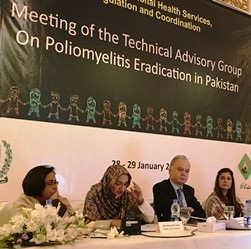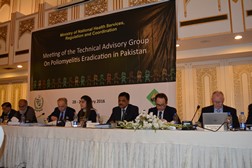“In spite of this, we still have areas that could risk it all. Not only the Kyber-Peshawar-Nahangar corridor as highlighted by the IMB, but in Karachi we have another hub of transmission. We need to put the maximum energy into Karachi.”
“If we increase our sensitivity, move closer to the ground with our interventions and focus more and more on the small scale, Pakistan will make it. I am confident of that.”
 Minister for National Health Services, Saira Azfal Tarar speaking to the TAG delegation in Islamabad, January 29, 2016He urged the Government of Pakistan to continue pushing for the highest level of political engagement with security forces and the country’s leadership.
Minister for National Health Services, Saira Azfal Tarar speaking to the TAG delegation in Islamabad, January 29, 2016He urged the Government of Pakistan to continue pushing for the highest level of political engagement with security forces and the country’s leadership.
The Prime Ministers Focal Point for Polio Eradication Senator Ayesha Raza Farooq thanked the TAG members for their commitment to supporting the Government of Pakistan in the noble fight to end polio. She gave a detailed review of the overall situation including pending questions and challenges the programme is facing.
“One of the programmes striking features has been its ability to translate lessons learnt quickly and efficiently and to apply strategic interventions” she said, “but we honestly believe we are on track to finish the job this year.”
WHO Representative in Pakistan, Michel Thieren said in his opening statement to the delegation that the programme owes it to every child of Pakistan to strive to finish the job.
“What I observe is that we are a programme, which is from the very top, in full charge – knocking on as many doors as we can and we are looking for every single unimmunized child.
“We are financially, politically and technically equipped for the task and we are closer this year than ever before,” he said.
The incoming global polio director of World Health Organization (WHO), Dr Michel Zaffran, who attended the meeting in Islamabad, said he was impressed by the commitment demonstrated by the Government of Pakistan and supporting teams.
“The commitment, the collaboration and the progress that we’ve seen at TAG has been commendable. We realize that the pressure is on and there is still a way to go, but the progress is incredible.”
Positive outlook for 2016 but risk remains
Dr Rana Muhammad Safdar, Coordinator of the National Emergency Operation Centre outlined the key areas of concern for the programme identifying the three remaining sanctuaries – the Khyber-Peshawar corridor, Karachi and the Quetta block. Dr Safdar said initiatives like Continuous Community Protected Vaccination (CCPV) targeted at the most difficult to reach children in the highest risk areas of Pakistan, an increase in use of LQAS to monitor performance of campaigns, the strategic shift to focus on tracking and vaccinating missed children and improvements to optimize the performance of supplementary immunization activities and strengthen surveillance has had a significant impact on the programme in 2015.
“CCPV has strengthened micro-planning and stabilized a local, overwhelmingly female workforce in these areas. This community-based workforce in now well motivated, trained and supervised, which is helping maintain access because they enjoy the trust of their communities.”
The programme has also implemented targeted IPV-OPV campaigns within high-risk areas to boost population immunity levels. The remaining 1.1 million doses of IPV will be strategically used in core reservoirs in the first quarter of 2016.
“We know that reaching ZERO in 2016 will require much more from us. We must maintain access to all children, immunize all accessible children, track the virus successfully, avoid complacency to ultimately reach our goal of interrupting transmission,” Dr Rana said.
TAG concluded that the goal of interruption of transmission in 2016 is achievable, but at risk unless there is further reduction in the immunity gaps especially in the core reservoirs.
They cautioned that the most important risk to timely interruption of transmission of poliovirus in Pakistan is Karachi. The city remains a hub for population interactions across Pakistan and Afghanistan, and an amplifier of imported and indigenous virus.
TAG said that a failure to sustain the commitment to polio eradication by government and partners at all levels, a reduction of provision of adequate protection for polio teams and an inability to ensure full immunization of all children, especially in core reservoir areas will derail the attempts to eradicate in 2016.
TAG delivered 22 recommendations that the Pakistan programme focus on including:
- further strengthening the coordination and collaboration with Afghanistan around synchronised campaigns and with the tOPV-bOPV switch in 2016;
- intensifying political commitment, including greater involvement of Commissioners; strengthening the focus on core reservoirs and identifying specific Action-Plans for poorly performing districts;
- focusing efforts on delivering high-quality immunization activities in the next 4 months everywhere, with particular focus on areas with evidence of poliovirus transmission, especially Karachi, Killa Abdullah, Khyber, Peshawar and Sukkur;
- improved community surveillance and environmental surveillance will be important for the detection of transmission over the coming months;
- lessons learnt from the CCPV experience should be used to improve performance in non-CCPV areas;
- TAG asked that Pakistan begin preparations for the 2016-2017 National Emergency Action Plan (NEAP) in the coming months and be prepared to reconvene mid-2016 to review and track progress.









